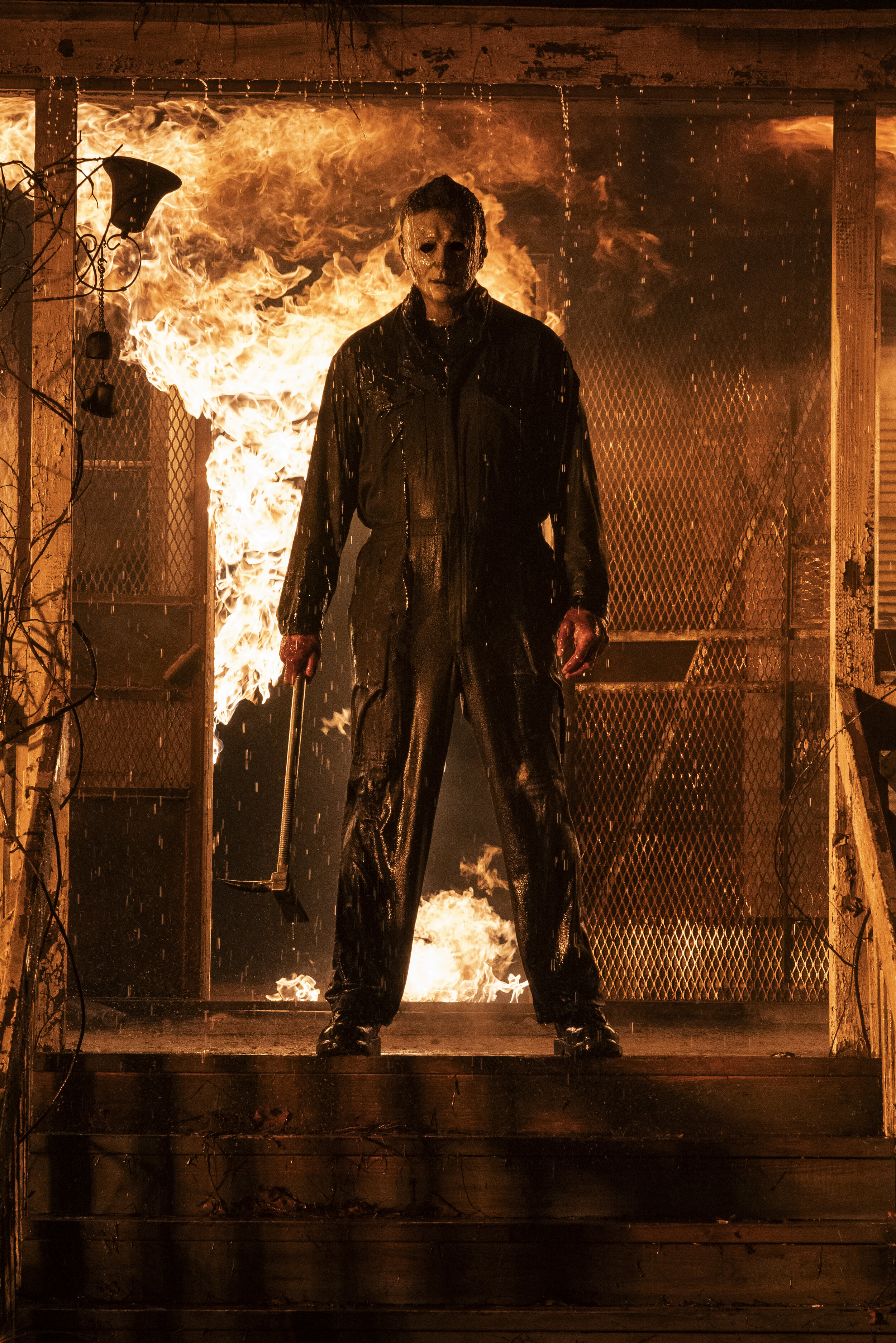Halloween Kills: Two really good Michael Myers movies in a row is a little much to axe for
By Thom Ernst
Rating: B-minus
Fifteen minutes into Halloween Kills, and the body count surpasses the limits of recall. Not surprising, given that brutal, unprovoked killings, and lots of them, are the sole purpose the Halloween franchise exists.
But Halloween Kills is the follow-up to director David Gordon Green’s surprisingly gripping and occasionally poignant reimagining of the franchise.
Green seemed an unlikely candidate to helm a Halloween reboot, particularly so soon after Rob Zombie's bleak and surprisingly uninteresting attempt to inject new blood into the franchise.
Before jumping on the Halloween bandwagon, Green's films were gentle movies about broken people in need of healing. Arguably, Michael Myers, the ambling killing machine created by John Carpenter and Debra Hill, is a broken man in need of healing. But the chances of Myers finding redemption is far less likely than that of Green's less violent protagonists played by Paul Rudd, or even Nicolas Cage.
But Green's interest was not in reinventing the Halloween franchise but in saving it. At some point between Halloween 2 and Halloween 10, Michael Myers lost his way. So, Green returned to Haddonfield to find him.
What Green created became a bigger shock than any one of the spectacular kills in the entire Halloween series. Green's Halloween was a revelation: Slasher films can have character, story, and meaning.
Can it be done twice?
It can.
Just, maybe not this time.
Halloween Kills picks up minutes after Halloween (2018) ends with Laurie (Jamie Lee Curtis) trapping Michael (played in turns by Nick Castle and James Jude Courtney) in a cellar and setting him ablaze. We believe it's the last of Michael Myers's reign of terror—except no, we don't really believe it.
PROUDLY SUPPORTS ORIGINAL-CIN
While Laurie, along with her daughter Karen (Judy Greer) and granddaughter Allyson (Andi Matichak), is rushed to the hospital with knife wounds to the stomach, a young couple (Michael Smallwood and Carmela McNeal), and four of the original 1978 survivors, are at a local bar raising a glass to survival.
Every Halloween night since the first Haddonfield attack, the surviving victims of Michael Myers' massacre, Lonnie (Robert Longstreet), Tommy (Anthony Michael Hall), Lindsay (Kyle Richards) and Marion (Nancy Stephens) gather to remember dead friends and acknowledge how great it is to be alive and how lucky they are.
But when news footage shows the aftermath of a massacre, Tommy knows that Michael is back. Tommy spearheads an angry mob to track down Myers and kill him. "Tonight, evil must die," becomes the mantra for the people of Haddonfield.
Green's attempts to push the Halloween narrative towards more classic horror tropes is admirable, but a bit of a stretch. Michael Myers is more Frankenstein Monster, minus the innocence than before, while Laurie makes for a strange Victor Frankenstein. And the mob recklessly tearing down the main street, trampling through hospital corridors, and even, at one point, picking up a pitchfork is akin to James Whales' image of townspeople storming the castle.
Curtis has less to do in Halloween Kills, confined mainly to a hospital bed. Still, her contributions, along with the those of a wounded Officer Hawkins (Will Patton), play like a Greek chorus, building up a new mythology out of stories from the past and an innate sense of what the future might hold.
There is reason to be excited about Halloween Kills in that it's a significant step outside of a franchise weakened by an assembly line of stalk-and-kill footage.
The film still gives fans what they want, but to praise the film on this basis alone would be misleading. Halloween Kills is not Citizen Kane (or Vertigo if you prefer). Halloween is still a Michael Myers slasher film. People meet horrible ends in extreme ways, and the plot rarely goes beyond the idea that someone really should put an end to all this nonsense.
The difference in Green's film is that he gives us a taste of the emotional aftermath; and that can be more horrifying than the kill itself. The dead are not nameless corpses (an exception is a group of firefighters unless you're good at reading name badges).
Most victims have characters, names and loved ones. Green is happy to provide a solid brutal kill, but not without us witnessing the reaction of a distraught mother discovering the horrible fate of her son, or a young man's breakdown when discovering his father's body. Were it not for the massive body count, you could almost credit Green for his humanity.
Green achieves as much artfulness as is possible for a film like Halloween, but the art in Halloween Kills is not as clear as it was in his first Halloween. Green substitutes moments like Laurie's emotional struggle and the poignancy of a young boy's attempt to tell his father a difficult truth, with a commentary on irrational mob mentality and the threat of our own bloodlust. It’s an attempt that just doesn’t register in the same way.
But give Green this; he knows how to end a movie, and Halloween Kills ends with a shocker.
Green is committed to three Halloween episodes; the final one, Halloween Ends, is scheduled to be released in 2022.
Then, assuming Michael is finally dead, Green moves on to a new project already in the works: A little thriller he's calling The Exorcist.
Halloween Kills is directed by David Gordon Green and stars Jamie Lee Curtis, Jane Greer, Andi Matichak, Michael Smallwood, Carmela McNeal, Robert Longstreet, Anthony Michael Hall, Kyle Richards, and Nancy Stephens. Halloween Kills is currently playing in selected theatres.



